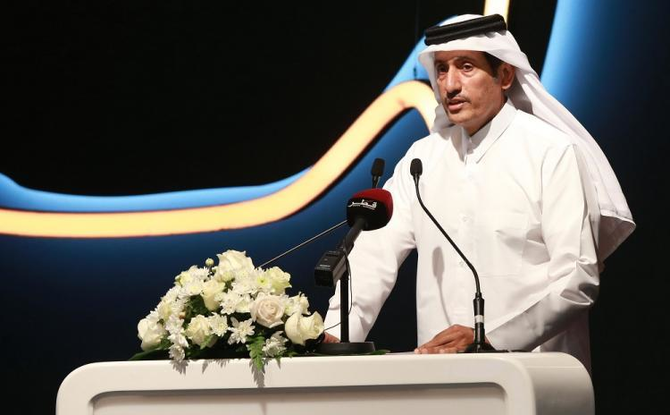LONDON: Al Jazeera came under renewed fire last weekend following the airing of a video branded as “Holocaust denial” on Arabic youth channel AJ+, which claimed that Jews exaggerated the scale of the genocide to help establish Israel.
This, however, is not the only incident in which the Qatari-owned news network was seen as being anti-Semitic and promoting such rhetoric. It has, time and again, proven to be a platform for preachers of hate, war and extremism.
Experts told Arab News that hate speech has been the cornerstone of Al Jazeera since its inception, saying the two employees fired for the recent AJ+ Arabic video were mere scapegoats.
If anyone is to blame, experts said, it is the long-term chairman of the Al Jazeera network, Qatari royal Hamad bin Thamer Al-Thani.
“If someone deserves the punishment, it would be him because of the channel’s history under his management,” said veteran journalist Abdellatif El-Menawy, who was until 2011 the head of news at Egypt’s national broadcaster.
El-Menawy said what happened at AJ+ is not surprising given that Al Jazeera’s reputation and history are “based on stirring hatred among people.”
------
RELATED: Qatari network Al Jazeera slammed over ‘Holocaust denial’ film
------
He added: “Proof of this is when the channel adopted, at a stage in its history, Osama bin Laden and his extremist speech that divided the world. There are also advocates of terrorism and discrimination who had TV programs for years, such as Yusuf Al-Qaradawi (who calls) for hatred of the other.”
Meanwhile, Al Jazeera English’s former international bureau chief, Mohamed Fahmy, told Arab News that the network’s editorial policy is “just as duplicit(ous) as the foreign policy of the Qatari government, which funds and drives the force of the daily coverage” of the channel. “One day they’re praising the Jewish community on their English-language channel directed at Western viewers, and the next day they’re promoting hate speech against the Jews on their Arabic channels, and allowing preachers like Qatar-based Yusuf Al-Qaradawi to endorse the killing of innocent women and children on Al Jazeera Arabic just because they’re Jews.”
Through his Al Jazeera program “Sharia and Life,” Egyptian cleric Al-Qaradawi issued religious edicts calling for the killing of Jews.
“Take the treacherous Jewish aggressors … They’ve spread too much tyranny and corruption on Earth. Oh God, take this Jewish Zionist band of aggressors and don’t spare a single one of them. Oh God, count their numbers, slay them one by one and spare none,” he said in a Jan. 9, 2009, sermon aired on Al Jazeera Arabic. In another sermon aired on Jan. 29 and 30 that same year, Al-Qaradawi said: “Throughout history, God has imposed upon them (Jews) people who would punish them for their corruption. The last punishment was that of Hitler. What he did to them — even though they exaggerate this issue — he managed to put a limit to what they were doing. This was a divine punishment for them. Next time, God willing, it will be done at the hands of the faithful believers.”
Fahmy is engaged in an ongoing lawsuit against the network for negligence, and he is not the only one to have taken legal action. Shannon High-Bassalik, Al Jazeera America’s former senior vice president for programming and documentaries, sued the defunct US network and its former CEO Ehab Al-Shihabi for violating her civil rights and breaching her contract.
In one clause of the lawsuit, High-Bassalik said: “As ratings failed to live up to the expectations of management, Al Jazeera openly decided to abandon all pretense of neutrality in favor of putting the Arabic viewpoint front and center, openly demanding that programs be aired that criticized countries such as America, Israel and Egypt.”
Employees made inflammatory statements such as “Israelis are like Hitler,” and “anyone who supports Israel should die a fiery death,” the lawsuit claimed. “Rather than discipline these offending employees, the Company brazenly demonstrated its true feelings by terminating the employment of individuals who dared stand up to complain about such blatant discrimination, especially coming from an ostensibly unbiased news organization.”
While there are many examples that give a sense of the anti-Semitic rhetoric that flows through the network’s airwaves, its most recent video led to the suspension of two journalists, with the network’s top bosses washing their hands of the case.
“The video content and accompanying posts were swiftly deleted by AJ+ senior management from all AJ+ pages and accounts on social media, as it contravened the Network’s editorial standards,” a company statement said.
But El-Menawy said: “The decision to stop and punish those who participated in such a documentary is a bluff.” Al Jazeera representatives did not respond when asked by Arab News whether action would be taken against other employees at the network.
US Embassy cables acquired by UK newspaper The Guardian in 2009 prove just how interconnected the Qatari government and Al Jazeera are.
“Al Jazeera, the most watched satellite television station in the Middle East, is heavily subsidized by the Qatari government and has proved itself a useful tool for the station’s political masters … Despite (the government of Qatar’s) protestations to the contrary, Al Jazeera remains one of Qatar’s most valuable political and diplomatic tools,” the cable read.
Fahmy, who is now CEO of the Canada-based Investigative Journal, said: “Unfortunately, it’s a network that’s nothing more than an extension of Qatari intelligence. It’s not a conclusion based only on the content it airs, but mostly on the malicious news-gathering process and irregular and illegal practices behind the scenes, with individuals and terrorist groups — a process that can in no way be affiliated with the noble craft of journalism.”


















